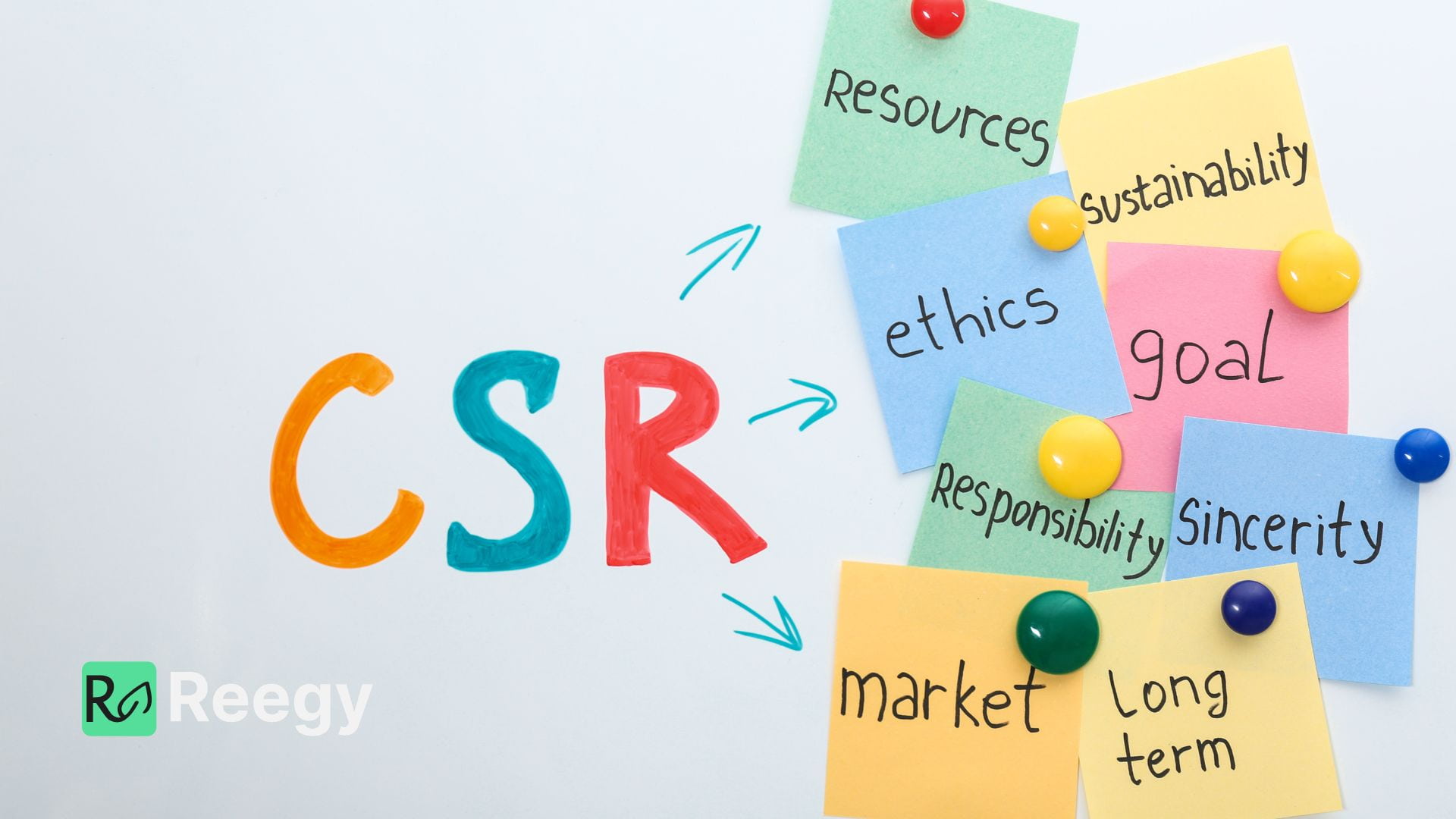
In today’s rapidly changing world, businesses are no longer judged solely on their financial performance. Consumers, employees, and investors are holding companies to higher standards—demanding transparency, accountability, and a commitment to making a positive impact. This shift has made Corporate Social Responsibility (CSR) not just a good practice, but a business imperative.
Let’s discuss what’s really behind the term and look at actionable advise on how to incorporate it in your business culture and operations.
What Is Corporate Social Responsibility (CSR)?
Corporate social responsibility (CSR) refers to a company’s commitment and responsibility to conduct business in an ethical, sustainable, and socially impactful way.
Companies are faced with the growing challenge that users want more than just “good” products. They want their products to be made in a good way and coming from a company that does good.
CSR encapsulates this approach by encouraging companies to integrate ethical practices, environmental stewardship, and social contributions into their core operations. This goes beyond compliance with laws and regulations; it’s about proactively addressing global challenges like climate change, inequality, and resource scarcity.
Imagine a clothing brand that not only makes stylish outfits but also ensures fair wages for its workers and uses sustainable materials. That’s CSR in action—going beyond selling a product to creating a positive impact on the planet and its people.

The Three Pillars of Corporate Social Responsibility
Corporate Social Responsibility is typically broken down into three key pillars:
- Environmental Responsibility
- Social Responsibility
- Governance Responsibility
Environmental Responsibility
Environmental responsibility focuses on minimizing a company’s ecological footprint and safeguarding natural resources. This means taking tangible steps like cutting carbon emissions, conserving energy, and cutting waste.
Companies can demonstrate environmental responsibility by committing to renewable energy and designing circular products that can be reused or recycled. By prioritizing sustainable practices, businesses contribute to the fight against climate change and align themselves with the values of eco-conscious consumers.
Social Responsibility
Social Responsibility is all about creating a positive and meaningful impact on people—whether it’s employees, customers, or the wider community. It often starts with prioritizing fairness and inclusivity at the workplace through diversity, equity, and inclusion (DEI) efforts but there is more to it than that. As a business you should actively invest in people and social causes, especially in your local communities.
You may come across even more granular distinctions here, such as from the Harvard Business School that divides social into ethical and philanthropic responsibility. Ethical Responsibility refers to operating in a fair and ethical manner, addressing issues like fair labor practices and human rights. Philanthropic Responsibility, on the other hand, means actively making the world a better place through charitable donations and community involvement.
Governance Responsibility
Governance Responsibility is essentially about running a business the right way. This means making decisions ethically, being transparent with stakeholders, and staying accountable. Strong governance isn’t just about compliance; it’s about earning trust by showing that the company operates with integrity at every level!

By addressing these three pillars, companies not only meet stakeholder expectations but also position themselves as leaders in a rapidly changing global landscape. These efforts form the foundation for any impactful CSR strategy and set the stage for long-term success.
Why Does CSR Matter for Your Business?
In a world where stakeholders demand accountability, CSR initiatives are no longer optional. Businesses with strong CSR programs often reap benefits such as improved brand reputation, employee retention, and access to sustainable financing.
Reporting Requirements
Regulations such as the EU CSRD, the US SEC Rule, or the UK SRS require companies to report on their CSR commitments and programs using a variety of sustainability reporting standards. Failing to meet reporting obligations can lead to harsh penalties and other disadvantages.
Increase Brand Loyalty
According to a Nielsen study, 73% of global consumers say they would change their consumption habits to reduce environmental impact. This growing consumer demand makes CSR a strategic advantage, not just a moral obligation. Likewise, employees, particularly from younger generations such as Gen-Z, are drawn to companies that align with their values, creating a more engaged and motivated workforce.
Better Products
Incorporating strong Corporate Social Responsibility programs is a known driver for innovation across the board. Moreover, as we show in our circular economy guide, it can also lead to new revenue streams and cost reductions in your company’s operations.
Financial Benefits
The financial benefits of CSR are equally compelling. Investors increasingly use Environmental, Social, and Governance (ESG) criteria to assess the viability of companies, making it easier for organizations with strong CSR practices to access capital. Furthermore, proactive CSR strategies help mitigate risks by addressing potential environmental or social crises before they escalate into regulatory or reputational challenges.
Technology is a key enabler of CSR success. Platforms like Reegy simplify data collection and reporting, automate compliance processes, and offer actionable insights to improve sustainability efforts. This allows you to focus on meaningful actions rather than getting bogged down by administrative tasks.
Common Challenges in Implementing CSR
For many businesses, the journey to meaningful CSR can feel overwhelming. Small and medium-sized enterprises (SMEs), in particular, face unique hurdles like limited budgets and resources. Without dedicated sustainability teams or clear guidance, the path forward can seem uncertain.
Businesses often struggle with a lack of expertise, making it difficult to establish where and how to begin. The complexity of collecting and managing data on carbon emissions, resource consumption, and social initiatives adds another layer of difficulty. Additionally, new regulatory frameworks, such as the EU’s Corporate Sustainability Reporting Directive (CSRD), create pressure to meet stringent compliance requirements.
Small and medium-sized enterprises (SMEs) often face even greater hurdles, including limited budgets and resources. These challenges can make CSR feel overwhelming, especially for businesses without dedicated sustainability teams or expertise in navigating ESG complexities.
At Reegy, we help companies achieve their CSR goals with our ESG software and expert CSR consulting services for businesses of any size!
5 Practical Steps to Build an Effective CSR Program
While there is no one-size-fits-all solution to CSR, we love breaking things down into manageable, easy to implement parts. At the heart of every CSR project, we use a 5-step process that can be adapted to the needs of the specific business:
1 Define your goals
The first step is defining your goals. Ask yourself what you want to achieve. Is it about reducing emissions? Boosting employee well-being? Or maybe increasing transparency in your operations? Clear and measurable goals set the foundation for everything that follows.
You can use Reegy’s ideation module to get inspiration on your next steps in your CSR journey!
2 Engage Stakeholders
After setting clear and measurable goals, the next step is bringing others on board. CSR thrives when it becomes a collective effort that engages employees, suppliers, and even customers. When everyone feels like they’re part of the journey, it creates a shared sense of purpose that drives meaningful change.
That’s also why trade in and refurbished programs from OEM’s like Apple and IKEA work so well!

3 Measure Impact
Once your initiatives are underway, it’s essential to measure your impact. This is where platforms like Reegy’s ESG hub shine. Tracking metrics like your carbon footprint, diversity in hiring, or energy consumption gives you a clear picture of what’s working and what needs adjustment.
4 Communicate Results
Transparency is key, so don’t keep your progress a secret. Share the results of your efforts through reports, social media, or even a dedicated section on your website. Communicating what you’ve achieved builds trust and encourages others to support your goals. You can do this from scratch or use software for this (of course, we do this, too!).
However, please don’t attempt greenwashing!
5 Adept and Scale
Finally, remember that CSR is never a one-and-done project. It’s an ongoing process that evolves with your business. Use feedback and data insights to adapt and scale your efforts, ensuring your program stays relevant and impactful as new challenges and opportunities arise.
How Reegy Supports Businesses in Their CSR Journey
At Reegy, we believe that CSR should be accessible to businesses of all sizes. Our slogan has long been “Sustainability simply needs to be simple” and our mission is to make the process as seamless as possible for you!
Reegy’s ESG Hub doesn’t just track your metrics—it visualizes your progress in real time, highlights areas for improvement, and even suggests actionable next steps. For one of our clients, a mid-sized traffic company, this meant identifying inefficiencies that led to a 15% reduction in emissions within a year. That’s impact you can measure.
A Better Future for Your Business and the Planet
Embracing Corporate Social Responsibility isn’t just good for the world—it’s good for business. With increasing pressure from consumers, regulators, and investors, CSR is no longer optional; it’s a necessity. Platforms like Reegy make it possible to bridge the gap between ambition and action, enabling businesses to meet their sustainability goals while staying ahead of the curve.
If you’re ready to take the next step in your CSR journey, explore what Reegy has to offer. Together, we can drive meaningful change for your business and the planet. Contact us for a free consultation or a demo of the Reegy platform!
Reegy is a complete software solution for ESG & Carbon Footprint Management. Our Reegy Eco Hub enables enterprises, financial institutions and governmental organizations to manage their climate action in one central location along the entire value chain. Track, measure, reduce, and offset your carbon emissions, disclose them to regulators, stakeholders, and customers and lead your company to Net Zero on autopilot!